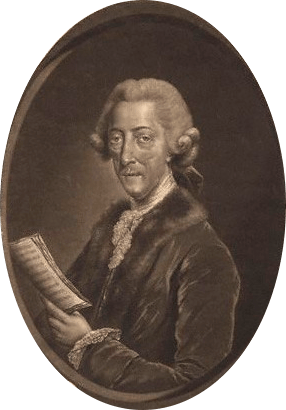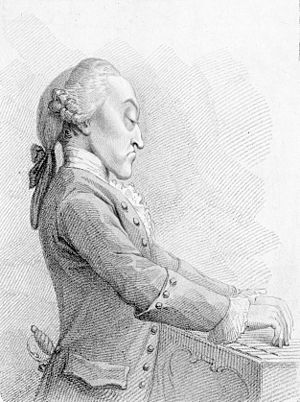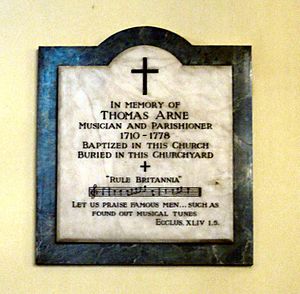Thomas Arne facts for kids
Quick facts for kids
Thomas Arne
|
|
|---|---|

Portrait by Robert Dunkarton, after William Humphrey, 1778
|
|
| Born |
Thomas Augustine Arne
12 March 1710 Covent Garden, London, England
|
| Died | 5 March 1778 (aged 67) London, England
|
| Education | Eton College |
Thomas Augustine Arne (/ɑːrn/; 12 March 1710 – 5 March 1778) was a famous English composer. He is best known for his patriotic song "Rule, Britannia!" and the fun song "A-Hunting We Will Go". This second song was written for a play called The Beggar's Opera in 1777 and later became a popular folk song and nursery rhyme. Arne was one of the most important theatre composers in Britain during the 1700s. He worked at famous London theatres like Drury Lane and Covent Garden. He wrote many musical shows for the stage and pleasure gardens, along with concertos and sonatas.
Early Life and Musical Dreams
Thomas Arne was born on March 12, 1710, in Covent Garden, London. He was baptized at St Paul's, Covent Garden.
Thomas came from a family of upholsterers. His father and grandfather both worked with furniture. His grandfather faced tough times and sadly died in a prison for people who couldn't pay their debts. However, Thomas's father earned enough money to rent a big house and send Thomas to a good school called Eton College. Later in life, his father also lost most of his money.
Thomas loved music very much. He even secretly brought a spinet (a small piano-like instrument) into his room. He would practice quietly at night, muffling the sound with a handkerchief so his family wouldn't hear. He also dressed up to sneak into the best seats at the Italian Opera. There, he met a musician named Michael Christian Festing, who became a big help to him. Festing taught Thomas to play the violin and took him to many musical events.
Thomas was supposed to become a lawyer after school. But his father found him leading a group of musicians at a gathering. When his father saw how much Thomas loved music and how talented he was, he was convinced to let Thomas follow his passion for music instead of law.
A Busy Musical Career
Between 1733 and 1776, Thomas Arne wrote music for about 90 stage shows. These included plays, masques (musical plays), pantomimes, and operas. Sadly, many of his original musical scores were lost in a big fire at the Royal Opera House in 1808.
Arne's sister, Susannah Maria Arne, was a famous singer. She performed in some of his early works, including his first opera, Rosamund. After she married an actor, she became known as "Mrs. Cibber." She and their brother Richard often performed Arne's music together.
Thomas Arne was also a Freemason, which is a social and charitable organization. He was very active in it.
On March 15, 1737, Arne married a singer named Cecilia Young. Her sister was married to another composer, John Frederick Lampe. Around this time, Arne's operas and musical plays became very popular. He even gained the support of Frederick, Prince of Wales. It was at the Prince's home, Cliveden, that Arne's famous Masque of Alfred, which included "Rule Britannia," was first performed in 1740.
In 1741, Arne was one of the first composers to go to court over copyright issues. He complained that some of his songs had been printed and sold without his permission. The problem was solved outside of court.
In 1742, Arne and his wife went to Dublin, Ireland, for two years. There, he created an oratorio (a large musical work) called The Death of Abel. He also put on several successful concerts. When he returned to London in 1744, he became the leader of the band at Drury Lane theatre. The next year, he became a composer at Vauxhall Gardens, a popular place for entertainment.
In 1750, Arne's sister, Susannah, moved from Drury Lane to Covent Garden Theatre after an argument. Arne followed her. In 1755, while in Dublin again, he separated from his wife, Cecilia. He then started a relationship with one of his students, Charlotte Brent, who was a talented singer. Charlotte performed in several of Arne's works, including his 1760 opera Thomas and Sally and his 1762 opera Artaxerxes. Later, Charlotte and Arne went their separate ways.
Later Years and Legacy
In the 1760s, Arne worked mostly at Covent Garden Theatre. He often worked with an Irish writer named Isaac Bickerstaffe. Arne's opera Thomas and Sally was special because it was the first English comic opera to be sung all the way through, without any spoken parts.
His opera Artaxerxes was one of the most successful and important English operas of the 1700s. It was a unique attempt to write an Italian-style opera in English, using sung recitative (like talking in song) instead of spoken words. Even Wolfgang Amadeus Mozart, a famous composer, saw it in 1764 and said it influenced his own operas. Artaxerxes was performed often in London for many years. In 1791, Joseph Haydn, another famous composer, was very impressed by a performance of Artaxerxes and said he didn't know such a great English opera existed.
In 1769, Arne wrote the song Soft Flowing Avon for the Shakespeare Jubilee. This event was held by David Garrick in Stratford-upon-Avon to celebrate the life of William Shakespeare. In 1773, in a performance of his oratorio Judith, Arne did something new: he included women's voices in the choruses for the first time.
In 1777, shortly before he passed away, Arne and his wife got back together. They had one son, Michael Arne, who also became a composer. Thomas Arne is buried at St Paul's, Covent Garden in London. A special blue plaque, put up in 1988, marks his former home at 31 King Street in Covent Garden.
Thomas Arne is remembered as one of Britain's greatest theatre composers of the 18th century. He is best known for his patriotic song "Rule, Britannia" and for "A-Hunting We Will Go". He is truly one of Britain's most important composers.
See also
 In Spanish: Thomas Arne para niños
In Spanish: Thomas Arne para niños
- List of compositions by Thomas Arne
 | Delilah Pierce |
 | Gordon Parks |
 | Augusta Savage |
 | Charles Ethan Porter |



